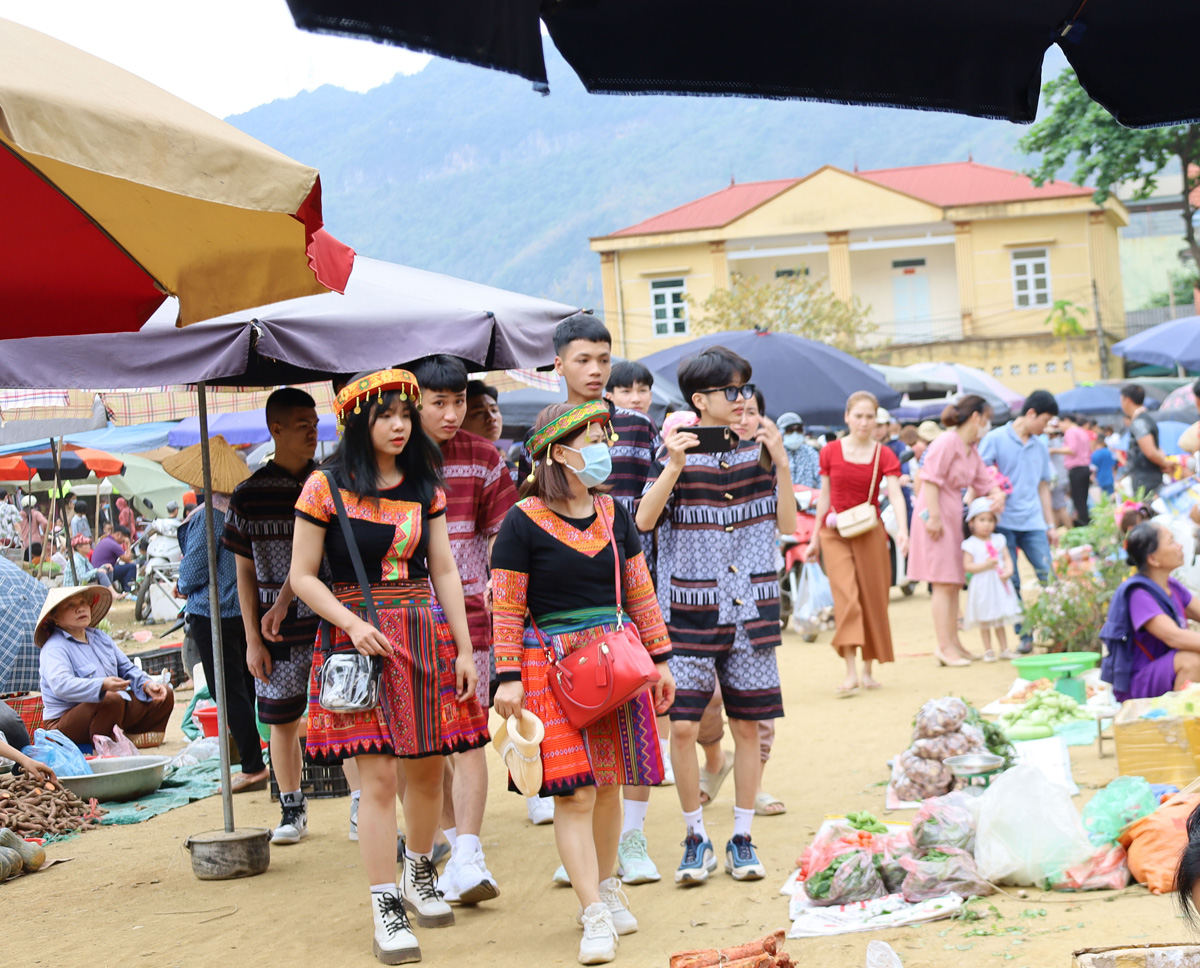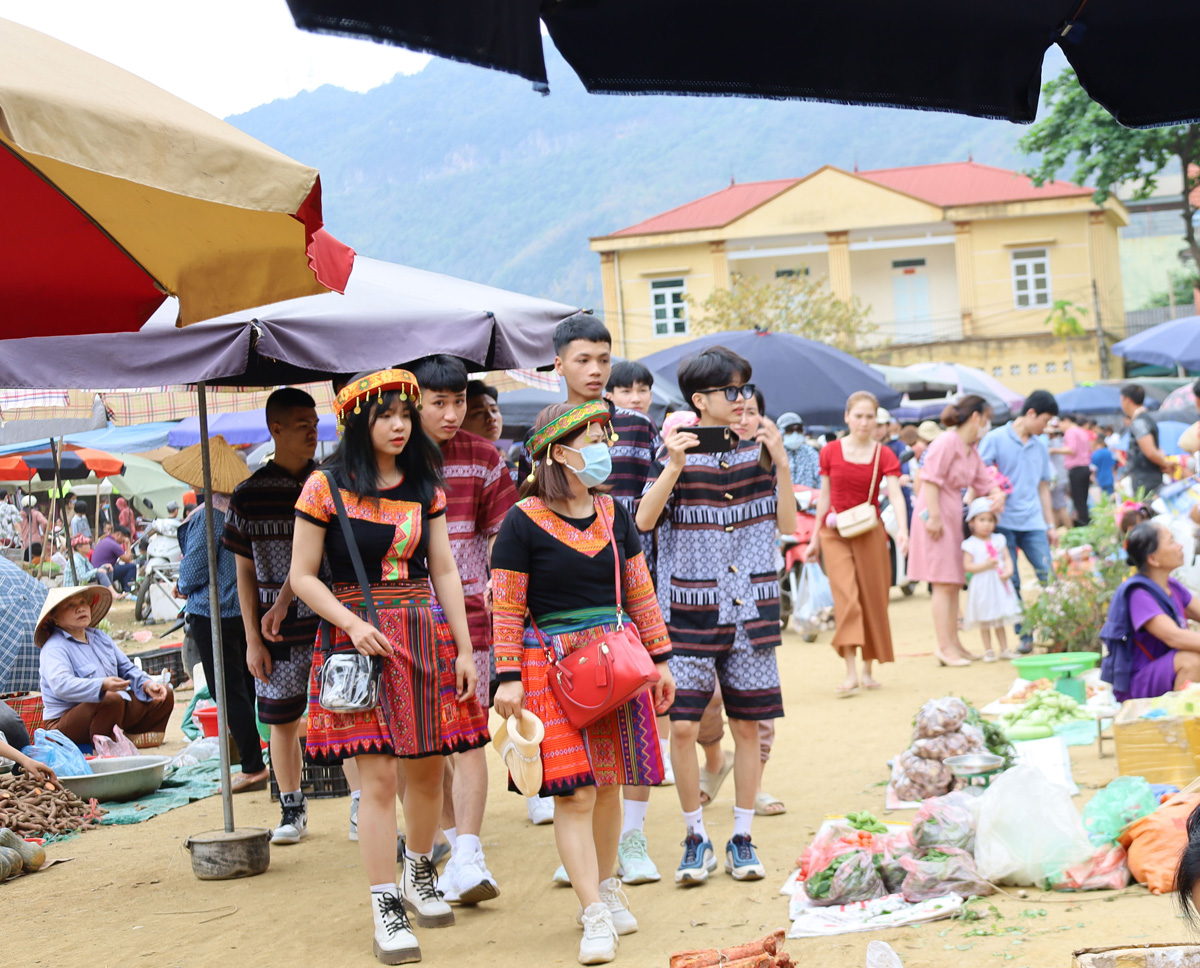
(HBO) – The Mai Chau uplandmarket - a unique tourism product of Hoa Binh province’s Mai Chau district – becomes more and more attractive to holidaymakers, offering tourists a venue to experience daily activities and understand more about traditional culture identities of the locality.

Visitors
are interested in traditional costumes sold at the market.
In the first Sunday of April, people from
the Hang Kia, Pa Co, Dong Tan, Son Thuy, Bao La, Chieng Chau, Mai Ha and Thanh
Son communes of Mai Chau district transport their products or those found in
forests such as orchids, vegetables, bitter bamboo shoots and mountain snails, to the market for sale.
Because loving the natural scenery and people of Mai Chau so much, many
tourists visit the destination not just once.
They said visiting the market, they have a chance to learn more about unique
cultural identities of the locality, and buy agricultural products that
have not been sold in Hanoi.
According to Vice Chairman of the
Mai Chau district People’s Committee Pham Van Hoan, the highland
marketfestival is held every Sunday as part of activities to mark the
southern liberation and national reunification day (April 30) and May Day (May
1), and to stimulate tourism demand.
During the festival, visitors enjoy music
performances imbued with national cultural identity and play popular folk games
such as tu lu, to le, and rope swing.
The festival contributes to introducing and popularising local tourism images,
beauty of local customs and cultural identities of ethnic minorities, thus
attracting more domestic and foreign visitors and further promoting
socio-economic development of the locality./.
With an increasingly vibrant and widespread emulation movement aimed at building cultured residential areas and cultured families, Yen Thuy District has been making steady progress toward improving both the material and spiritual well-being of its people, while fostering a civilized, prosperous, beautiful, and progressive community.
Once lacking recreational spaces and community facilities, Residential Group 2 in Quynh Lam Ward (Hoa Binh City) has recently received attention for the construction of a new, spacious, and fully equipped cultural house. The project followed the model of state support combined with public contributions in both labor and funding.
The "All people unite to build cultural life" movement, which has been effectively integrated with Kim Boi district’s socio-economic development goals, is fostering a lively spirit of emulation across local residential areas, hamlets, villages, public agencies, and enterprises. In addition, through the initiative, traditional cultural values are being preserved and promoted, while community solidarity and mutual support in poverty reduction and economic development are being strengthened.
A working delegation of the Hoa Binh provincial People’s Committee led by its Permanent Vice Chairman Nguyen Van Toan on June 11 inspected the progress of a project to build the Mo Muong Cultural Heritage Conservation Space linked to tourism services in Hop Phong commune, Cao Phong district.
Born and growing in the heroic land of Muong Dong, Dinh Thi Kieu Dung, a resident in Bo town of Kim Boi district, in her childhood was nurtured by the sweet lullabies of her grandmother and mother. These melodies deeply imprinted on her soul, becoming an inseparable part of her love for her ethnic group's culture. For over 20 years, this love for her hometown has driven Dung to research, collect, and pass down the cultural values of the Muong people to future generations.
In the final days of May, the Ethnic Art Troupe of Hoa Binh Province organized performances to serve the people in remote, mountainous, and particularly disadvantaged areas within the province. These were not just ordinary artistic shows, but they were the meaningful journeys aimed at spreading cultural values, enhancing the spiritual life of the people and contributing to the preservation of ethnic minority cultural identities.



